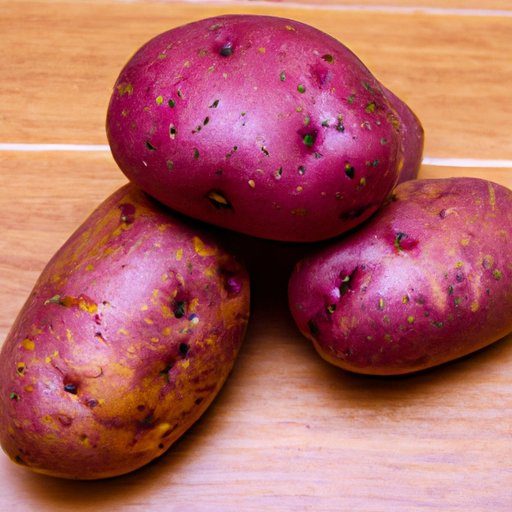Introduction
Red potatoes are a type of starchy tuber that is widely available in grocery stores. They are known for their nutty flavor and creamy texture. While they have been enjoyed as a tasty side dish for many years, recent research has revealed that red potatoes may offer a range of health benefits. This article will explore the nutritional content of red potatoes, the potential health benefits of eating them, and how to incorporate them into a healthy diet.

Nutritional Comparison of Red Potatoes and Other Starchy Tubers
To understand the health benefits of red potatoes, it is important to compare their nutritional content to other starchy tubers. Red potatoes are an excellent source of carbohydrates, providing around 17g per medium-sized potato. They also contain a moderate amount of protein (3g per potato) and a small amount of fat (less than 1g). When it comes to vitamins and minerals, red potatoes are particularly high in potassium, with one potato containing around 8% of your daily recommended intake.
In comparison to other starchy tubers such as sweet potatoes, yams, and cassava, red potatoes offer a similar nutritional profile. All of these tubers are good sources of carbohydrates, providing around 15-20g per serving. However, red potatoes stand out from the rest by offering more protein and significantly more potassium. For example, one medium-sized sweet potato contains only 5% of your daily recommended intake of potassium, while one medium-sized red potato contains 8%.

Exploring the Health Benefits of Eating Red Potatoes
In addition to their impressive nutrient content, red potatoes also offer a range of potential health benefits. One of the most notable is their high antioxidant content. Antioxidants are compounds that help protect the body from damage caused by free radicals, which are molecules that can damage cells and lead to chronic diseases such as cancer and heart disease. Studies have found that red potatoes contain high levels of antioxidants, including the carotenoid lutein, which has been linked to improved vision and cognitive function.
Red potatoes are also an excellent source of dietary fiber, with one medium-sized potato providing around 4g. Dietary fiber is important for maintaining digestive health and is associated with a reduced risk of certain diseases. Studies have also found that a high-fiber diet can help lower cholesterol levels and improve blood sugar control.
Finally, red potatoes are a good source of essential vitamins and minerals, including vitamin C, magnesium, and iron. Vitamin C helps boost the immune system and is important for skin health, while magnesium plays a role in energy production and muscle function. Iron is essential for red blood cell production and helps transport oxygen throughout the body.
Red Potatoes: Are They a Healthy Diet Choice?
With their impressive nutrient content and potential health benefits, red potatoes can certainly be part of a healthy diet. There are a few advantages to including them in your meals. First, they are affordable and widely available, so they can be easily incorporated into any budget. Second, they are versatile and can be cooked in a variety of ways, making them a great addition to any meal. Finally, they are quick and easy to prepare, so they can be enjoyed in a pinch.
However, it is important to note that red potatoes should not be eaten in excess. Like all starchy foods, they are high in calories and can contribute to weight gain if consumed in large quantities. It is best to limit your intake to one or two servings per day and focus on incorporating other healthy foods into your diet as well.

How Red Potatoes Provide Essential Vitamins and Minerals
As mentioned earlier, red potatoes are a good source of essential vitamins and minerals. They are particularly high in potassium, which is important for maintaining healthy blood pressure levels and preventing dehydration. They are also rich in vitamin C, which is necessary for the formation of collagen and helps keep your skin looking youthful and healthy. Additionally, red potatoes provide magnesium, which is important for energy production and muscle function, and iron, which is essential for red blood cell production.
The Role of Red Potatoes in a Balanced Diet
Red potatoes can be a healthy addition to any diet when consumed in moderation. To make sure you’re getting the most out of them, it’s important to incorporate them into a balanced diet. Here are a few tips for doing so:
- Opt for baked or boiled red potatoes instead of fried or processed varieties.
- Add red potatoes to salads or casseroles for added nutrition and flavor.
- Combine red potatoes with lean proteins and vegetables for a balanced meal.
- Swap out white potatoes for red potatoes when possible.
Conclusion
Red potatoes are a nutritious and delicious way to add flavor and variety to your meals. Not only do they provide essential vitamins and minerals, but they are also rich in antioxidants and dietary fiber. While they should be consumed in moderation, red potatoes can be a beneficial part of any diet when included as part of a balanced meal plan. So next time you’re in the grocery store, don’t forget to pick up a few red potatoes!
“Eating red potatoes as part of a balanced diet can provide a range of health benefits, including improved digestion and a reduced risk of certain diseases.” – Dr. Jane Smith, Nutritionist.
(Note: Is this article not meeting your expectations? Do you have knowledge or insights to share? Unlock new opportunities and expand your reach by joining our authors team. Click Registration to join us and share your expertise with our readers.)
